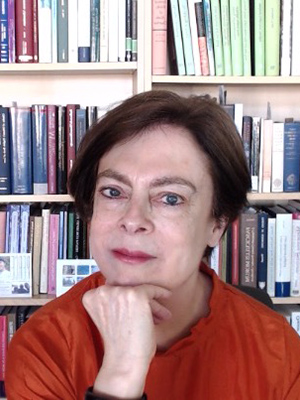HUMS 134, The Multicultural Middle Ages

Course Description:
This course studies English and European literature in its broader Mediterranean contexts before it became canonic, author-bound, and nation-centred. This is the period of the Crusades (late 11th-15th centuries) when Europeans and the Islamic civilizations of West Asia and North Africa engaged in extreme violence and hostility. Yet this period was also marked by alliances, cooperation, intellectual exchange, and forms of tolerance and admiration between Christians and Muslims. In this course, we will place English, European, and non-European texts in dialogue, focusing on genres – travel writing, epic, dream visions, mystical writing, the lyric, and autobiography – in which many cultures mingled. We will explore Christian and Islamic poetic responses to the Crusades, tales of interreligious love and betrayal, the accounts of English, Italian, and Moroccan travellers, the strange lives of female recluses and martyrs, the passionate writing of monks and scholars, the sharp-edged brilliant comedy of Chaucer. English translations will be available for all texts, which will also be studied (where possible) alongside their original languages.
There are two main aims. One is to discover a Middle Ages that is different from the one popularly projected in modern culture: obsolete, primitive, bigoted, sexist, cruel. As the United States, and modern nations globally, face up to endemic prejudice and rampant anti-blackness, this course will ask why the remote past is invoked so often – and so distortedly – in discussions of cultural, religious, racial, and gender difference today. Perhaps this tells us something about our own societies that we should seek out and critically investigate. The other aim is to break the barriers between canonical and noncanonical authors, European and non-European traditions, and literature and history, focusing on mutual influences and exchange. We will consider issues of gender, class, religious difference, and race from multiple perspectives and in all their intersectional complexity. In sum, moving between the era of the Crusades and the twenty-first century, Europe and the Islamic Mediterranean, this course focuses on mechanisms of self-construction in relation to those perceived as different.
Led By:
 |
Professor Ardis ButterfieldArdis Butterfield specialises in the literatures and music of France and England from the 13th to 15th centuries; continental and insular vernacular manuscripts and the relationships between them; city writing; the medieval lyric; Chaucer and nationhood; bilingualism and medieval linguistic identities; and theories and histories of language, form, and genre. With secondary appointments as professor of French and music, her scholarship distinctively traverses disciplines. Her books include Poetry and Music in Medieval France (2002), and The Familiar Enemy: Chaucer, Language and the Nation in the Hundred Years War (2009) which won the 2010 Society for French Studies R.H. Gapper Prize and was a Choice Outstanding Academic Title (2010). She has edited two collections of essays: Chaucer and the City (2006) and, with Henry Hope and Pauline Souleau, Performing Medieval Text (2017), and some 60 articles and essays. Co-founder with Helen Deeming of the Medieval Song Network (2010-14), a collaborative, international project to encourage new interdisciplinary research on the medieval lyric, she currently co-hosts the Yale–based research group Medieval Song Lab, and an annual colloquium on Anglophone Histories which she also co-founded at Yale in 2013. She was elected President of the New Chaucer Society in 2016 – 2018 and, along with many other editorial and advisory roles within international book series, journals, and research grant networks, is co-founder and general co-editor of the monograph series Oxford Studies in Medieval Literature and Culture. Butterfield held teaching positions at Cambridge and University College London before coming to Yale in 2012 as professor of English. Her visiting appointments include periods at the University of Virginia, the Huntington Library, San Marino and All Souls College, Oxford. She spent 2018-19 as a visiting fellow of Trinity College, Cambridge and senior research fellow at the Faculty of English, University of Cambridge. She has three books in progress: a new edition of medieval English lyrics for W.W. Norton & Company; a book on song in the middle ages, Medieval SongWriting; and a biography, Chaucer: A London Life. She is also leading a research team at Yale to develop a new Digital Archive of Medieval Song: https://web.library.yale.edu/dhlab/medievalsong For an interview at the Yale Macmillan Centre, see: https://www.youtube.com/watch?v=KFdPWu0-N2c |
 |
Professor Marcel EliasMy research explores the literature and history of medieval England and Europe more generally, often within a broader Mediterranean context. I am particularly interested in crusade and travel writing, the relations between Europe and the Islamic world, chivalric literature and culture, the psychology of entertainment media, the genres of epic and romance, the history of emotions, translation studies, and postcolonial theory. I am currently completing a first book, entitled Crusade Literature and the Interrogation of Self: Romance and History, 1291-1453 (under contract with Cambridge UP), which focuses on the representation of emotions in popular English crusade romances and various other international writings (literary, historical, pastoral, and legal) to reveal late medieval anxieties, doubts, and critiques related to the crusades. I have also begun work on two other projects. The first explores the influence of Islam on key literary, social, and philosophical movements in Europe from the Middle Ages to the early modern period. The second is a study of the nature, aims, and scope of world literature in medieval England. My essays have appeared or are forthcoming in The Review of English Studies, New Medieval Literatures, Studies in Philology, and The Oxford History of Poetry in English, among other venues. My research has been supported by fellowships from St Catharine’s College, Cambridge, the Swiss National Science Foundation, and the Council for British Research in the Levant. During my PhD in Cambridge, I was a Scholar of the Bill & Melinda Gates Foundation. |